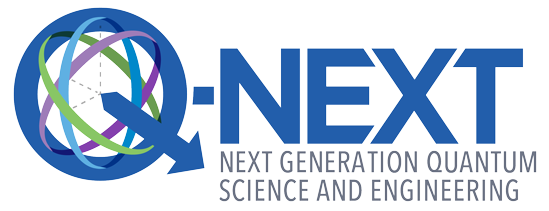In the News
-
Jelena Vučković appointed at MPQ as new external scientific member
From the Max Planck Institute for Quantum Optics: Q-NEXT collaborator and Stanford University Professor Jelena Vučković has been connected to the Max Planck Institute of Quantum Optics for years. She has now been appointed an external scientific member of the institute. Read More
-
Ask an expert: Choy discusses qubits, atomic clocks, computing and more
From the University of Wisconsin–Madison: In this Q&A, Q-NEXT collaborator and University of Wisconsin–Madison Assistant Professor Jennifer Choy discusses quantum sensing, one of several growing research fields that use quantum mechanics for applications ranging from creating nanoscale optical sensors to the supercomputers of the future. Read More
-
IBM and top universities to advance quantum education for 40,000 students in Japan, South Korea and the United States
From PR Newswire: IBM has announced the company intends to engage with Keio University, the University of Tokyo, Yonsei University, Seoul National University and the University of Chicago to work together to support quantum education activities in Japan, Korea and the United States. IBM intends to deliver educational offerings, in combination with contributions from each of the participating universities, to advance the training of up to 40,000 students over the next 10 years to prepare them for the quantum workforce and promote the growth of a global quantum ecosystem. Read More
-
Infleqtion Selected to join Japan's Quantum Moonshot program with leading neutral atom quantum computing platform
From PR Newswire: Q-NEXT partner Infleqtion has been selected by Japan's Science and Technology Agency as the only foreign quantum computing partner in the Quantum Moonshot program, a cutting-edge initiative to advance Japan's technological capabilities and to revolutionize Japan's economy, industry, and security by 2050. As part of the program, Infleqtion will collaborate to develop a large-scale, neutral atom quantum computer with high-fidelity qubits. Read More
-
Hannes Bernien awarded the 2023 Klung Wilhelmy Science Prize for pioneering quantum work
From the University of Chicago: Q-NEXT collaborator Hannes Bernien of the University of Chicago has won the Klung Wilhelmy Science Prize in Physics for his pioneering early studies on defect centers in diamonds and work he is currently pursuing to develop quantum technology platforms based on Rydberg atoms. Read More
-
IBM releases first-ever 1,000-qubit quantum chip
From Nature: Q-NEXT partner announces its latest huge chip — but will now focus on developing smaller chips with a fresh approach to error correction. Read More
-
Companies, countries battle to develop quantum computers
60 Minutes: Q-NEXT partner IBM is featured in this "60 Minutes" segment on quantum computers. Companies and countries are in a race to develop these machines, which could revolutionize problem solving in medicine, physics, chemistry and engineering. Read More
-
U.S. Department of Energy announces first-of-its-kind collaboration for quantum technology demonstrations in space
From the U.S. Department of Energy: The U.S. Department of Energy announces the first round of participants dedicated to the Quantum & Space Collaboration, which has garnered an array of participants, including Q-NEXT partner Infleqtion. Read More
-
Quantum capital of the world: emerging field that could solve ‘unsolvable’ problems
From WGN News: Chicago is aiming to become the quantum capital of the world. Public and private investment, workforce efforts, tech startups, and collaboration across academia, government and industry are all helping position Illinois as a leader in the quantum revolution. The WGN news piece features Q-NEXT Director David Awschalom and Q-NEXT collaborator Pranav GQuantum capital of the world: Emerging field that could solve ‘unsolvable’ problems okhale of Infleqtion. Read More
-
Fact Sheet: Biden-Harris administration announces 31 regional tech hubs to spur American innovation, strengthen manufacturing and create good-paying jobs in Every Region of the Country
From the White House: President Biden and Secretary of Commerce Gina Raimondo announce the designation of 31 communities across the country as Regional Innovation and Technology Hubs (Tech Hubs) through the Department of Commerce Economic Development Administration. The 31 Tech Hubs focus on developing and growing innovative industries, including quantum computing. One of the tech hubs is the Bloch Tech Hub, led by the Chicago Quantum Exchange. Read More
News and features
See all news and features-
Design rules and synthesis of quantum memory candidates
From the University of Illinois Urbana-Champaign: Researchers use density functional theory calculations to identify possible europium compounds to serve as a new quantum memory platform. They also synthesize one of the predicted compounds, a brand new, air-stable material that is a strong candidate for use… Read More
-
‘Ruler for light’ could enable detailed measurement in personal devices
Frequency combs have revolutionized precision measurement, but the bulky, power-hungry devices are limited to lab settings. A new efficient laser “microcomb” developed by Stanford researchers could bring that revolution to the handheld electronics realm. Read More
-
Resurrecting niobium for quantum science
For years, niobium was considered an underperformer when it came to superconducting qubits. Now scientists supported by Q-NEXT have found a way to engineer a high-performing niobium-based qubit and so take advantage of niobium’s superior qualities. Read More
-
Researchers from startups, government labs and academia develop new techniques for making qubits out of erbium
Argonne project addresses quantum technology challenges and highlight sthe versatility of a rare-earth metal used in lasers and to color glass. Read More
-
Meet Edward Schmitt, facilities engineer
Former Marine Corps electronics technician Edward Schmitt keeps the Argonne Quantum Foundry running while advocating for veterans. Read More
